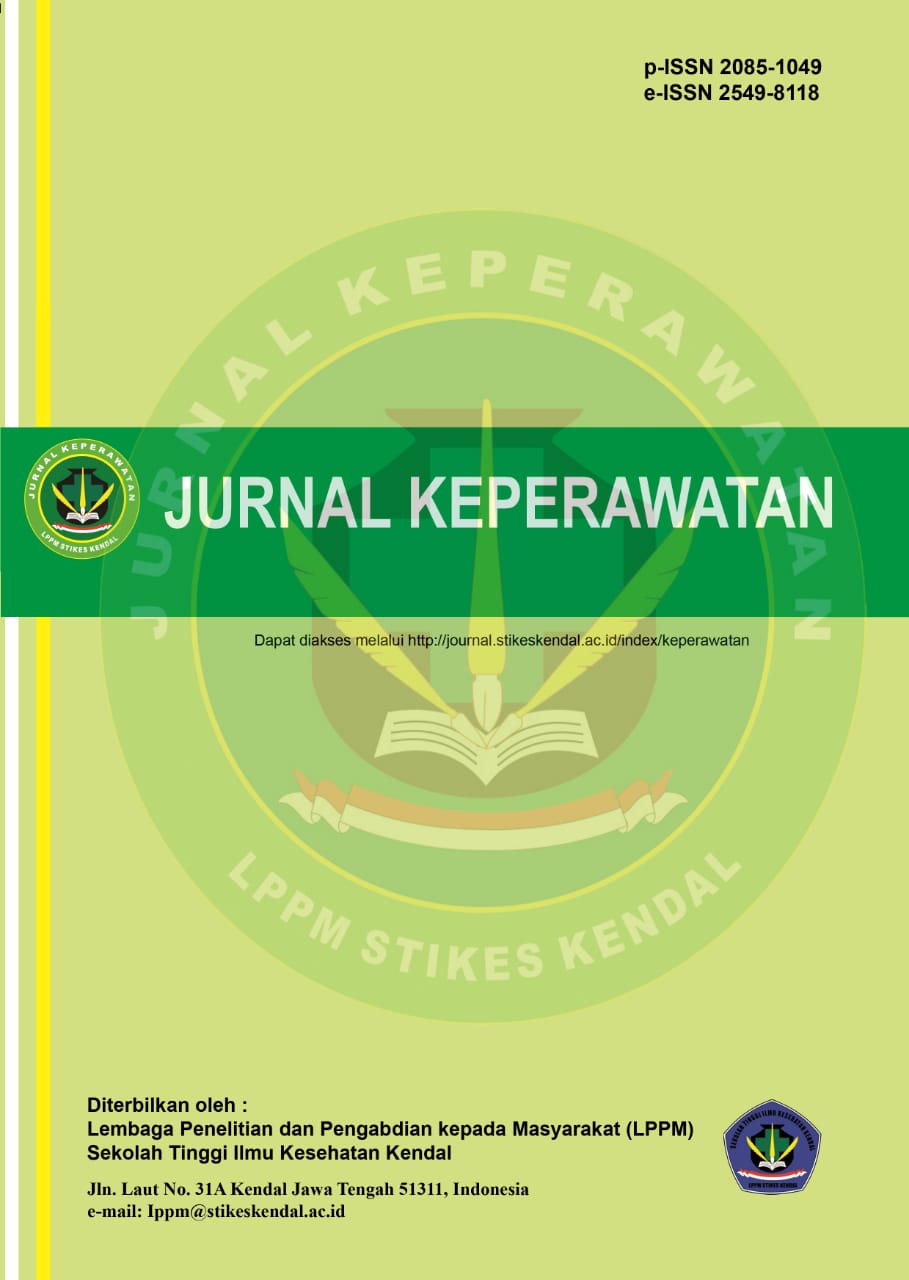Stress Level Response of Nursing Students to Online Learning During the Covid-19 Pandemic
DOI:
https://doi.org/10.32583/keperawatan.v14iS1.79Keywords:
covid-19, online learning methods, stress levels, studentsAbstract
The Covid-19 pandemic has caused crises in various aspects, including in education. To resolve it, the Indonesian government shifted the face-to-face learning method to the online learning method. Online learning is one of the solutions to teaching and learning during the Covid-19 pandemic. This change causes the need for adaptation for students. The inability of students to adapt to the makes them stressed. This study aimed to determine the stress level response of the three-semester undergraduate nursing student with online learning during the Covid-19 pandemic. This study uses a quantitative descriptive design. The population in this study were all active undergraduate nursing students in the 3rd semester of Mitra Indonesia University as many as 114 students, with a research sample of 72 students taken by simple random sampling technique with the Lemeshow formula. The validity test results showed that the questionnaire was valid with a Pearson’s correlation value of=0,3 reliable with Cronbach’s alpha of=0,8. The collected data were analyzed using descriptive statistics. The results of this study that 20,8% respondents (n=15; 20,8%) who normal stress, mild stress 4 respondents (n=4; 5,6%), moderate stress (n=16; 22,2%), while the respondents who feel they are experiencing severe stress (n=17; 23,6%), and very severe stress there are (n=20; 27,8%). Conclusions: Based on the results of this study, it was concluded that 27,8% of students felt very severe stress by online learning during the Covid-19 pandemic.
References
Angelica, H., & Tambunan, E. H. (2021). Stres Dan Koping Mahasiswa Keperawatan Selama Pembelajaran Daring Di Masa Pandemik Covid-19. Jurnal Ilmiah Keperawatan Imelda, 7(1), 28–34. https://doi.org/10.52943/jikeperawatan.v7i1.508
Apriana & anita. (2015). Riset Keperawatan. Poltekes Tanjung Karang.
Aslan, H., & Pekince, H. (2020). Nursing students’ views on the COVID-19 pandemic and their percieved stress levels. Perspectives in Psychiatric Care, 1–7. https://doi.org/10.1111/ppc.12597
Astuti, P., & Febrian, F. (2019). Blended Learning Syarah: Bagaimana Penerapan dan Persepsi Mahasiswa. Jurnal Gantang, 4(2), 111–119. https://doi.org/10.31629/jg.v4i2.1560
Barseli, M., & Ifdil, Ifdil & nikmarijal, N. (2017). Konsep Stres Akademik Siswa. Jurnal Konseling Dan Pendidikan, 5(3), 143–148. https://doi.org/10.29210/119800
Besser, A., Lotem, S., & Zeigler-hill, V. (2020). Psychological Stress and Vocal Symptoms Among University Professors in Israel : Implications of the Shift to Online Synchronous Teaching During the COVID-19 Pandemic. Journal of Voice, 1–8.
Ekiz, T., Ilıman, E., & Dönmez, E. (2020). COMPARISON OF HEALTH ANXIETY LEVEL AND CONTROL PERCEPTION OF COVID-19. ULUSLARARASI SAĞLIK YÖNETİMİ VE STRATEJİLERİ ARAŞTIRMA DERGİSi, 6(1), 139–154. https://dergipark.org.tr/en/pub/usaysad/issue/54067/729076
Flett, golden L. & helwit. pau. L. (2020). the perfectionism pandemic meets covid-19: understanding the stress, distress, and problems in living for perfectionists during the global health crisis. Journal of Concurrent Disorders, 2(1), 80–105.
Harahap, A. C. P., Harahap, D. P. &, & Harahap, S. R. (2020). Analisis Tingkat Stres Akademik Pada Mahasiswa Selama Pembelajaran Jarak Jauh Dimasa Covid-19. Biblio Couns : Jurnal Kajian Konseling Dan Pendidikan, 3(1), 10–14. https://doi.org/10.30596/bibliocouns.v3i1.4804
Hasanah, U., Fitri, N. L., Supardi, S., & PH, L. (2020). Depresi pada mahasiswa selama masa pandemi covid-19. Jurnal Keperawatan Jiwa, 8(4), 421–424. https://doi.org/10.26714/jkj.8.4.2020.421-424
Hidayah aas aliana futriani, robiah al adawiyah, prima ayu rizqi mahanani. (2020). Efektivitas Pembelajaran Daring Pada Masa Pandemi Covid-19: Jurnal Penelitian Ilu-Ilmu Sosial, 21(2), 53–56. https://doi.org/10.36490/value.v2i1.177
Kartika Sari, M. (2020). Tingkat Stres Mahasiswa S1 Keperawatan Tingkat 19 and Online Lecturer At Karya Husada Health Institute. 31–35. https://media.neliti.com/media/publications/327964-tingkat-stres-mahasiswa-s1-keperawatan-t-251bf6e6.pdf
Maulana, H. A., & Iswari, R. D. (2020). Analisis Tingkat Stres Mahasiswa Terhadap Pembelajaran Daring Pada Mata Kuliah Statistik Bisnis Di Pendidikan Vokasi. Khazanah Pendidikan, 14(1), 17–30. https://doi.org/10.30595/jkp.v14i1.8479
Rizki Setiawan, & Eti Komalasari. (2020). Membangun efektifitas pembelajaran sosiologi di tengah pandemi Covid-19. EDUSOCIUS Jurnal Ilmiah Penelitian Pendidikan Dan Sosiologi, 4(1), 1–13. https://ejournal.undiksha.ac.id/index.php/ED/article/viewFile/25073/15152
Rusdiana, E., & Nugroho, A. (2020). Respon pada Pembelajaran Daring bagi Mahasiswa Mata Kuliah Pengantar Hukum Indonesia. Integralistik, 31(1), 1–12. https://journal.unnes.ac.id/nju/index.php/integralistik/article/view/21834%0Ahttps://journal.unnes.ac.id/nju/index.php/integralistik/article/view/21834/
Sadikin, A., & Hamidah, A. (2020). Pembelajaran Daring di Tengah Wabah Covid-19. Biodik, 6(2), 215–224. https://doi.org/10.22437/bio.v6i2.9759
Santika, I. W. E. (2020). Pendidikan Karakter pada Pembelajaran Daring. Indonesian Values and Character Education Journal, 3(1), 8–19. https://ejournal.undiksha.ac.id/index.php/ED/article/viewFile/25073/15152
Siregar, I. K., & Putri, S. R. (2019). Hubungan Self-Efficacy dan Stres Akademik Mahasiswa. Consilium : Berkala Kajian Konseling Dan Ilmu Keagamaan, 6(2), 91–95. https://doi.org/10.37064/consilium.v6i2.6386
Downloads
Published
How to Cite
Issue
Section
License
Copyright (c) 2022 Jurnal Keperawatan

This work is licensed under a Creative Commons Attribution-NonCommercial-NoDerivatives 4.0 International License.




